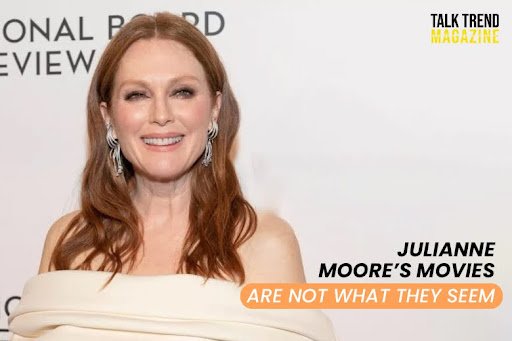Julianne Moore has been entertaining audiences for over 40 years—not by playing it safe, but by digging deep into the messy, emotional, and really basic features of being human. Her performances often carry a quiet depth that lingers long after the credits roll.
While a few viewers can also presume her films to follow a familiar method that uses moody dramas, complicated characters, emotional breakdowns. Moore is well aware of these expectations. In fact, she welcomes them. What drives her is not just telling a tale—it is making humans assume, query, and feel.
Telling Stories That Feel Real
Moore’s frame of work is full of characters that replicate the wealthy and sometimes painful layers of ordinary reality. In Still Alice, she played a linguistics professor character who was diagnosed with early-onset Alzheimer’s. It was a heart-wrenching role, one that earned her an Oscar, and rightly so. To prepare for the character, she dived into precise research in which she worked with medical doctors and actual-life patients to make sure her performance was not just accurate, but deeply respectful.
Then there was “Far from Heaven”, in which she steps into the position of a Fifties housewife going through emotional isolation, racial tension, and her husband’s secret. The movie nods to the golden age of Hollywood melodramas whilst peeling back layers of cutting-edge identity and societal stress. Moore brings intensity to a function that could have, without problems, been one-dimensional.
Choosing Roles That Defy Expectations
Moore does not chase usual Hollywood scripts. She seems to like tales that dig below the surface. “Take May December”, for instance. In it, she performed Gracie, a lady with a debatable past whose existence is revisited years later. The film explores issues of performance, identification, and public image, often using literal mirrors to image how humans see themselves, and others.
Another standout is Sharper, a thriller where nothing is as it appears. Moore’s character shows that a world is constructed on lies, manipulation, and greed. What intrigued her was not just the plot twists, despite the way the film questions how society measures achievement and worth.
For Moore, storytelling is set to get people to stop and think, especially when the topic hits close to home.
Finding the Emotion in Every Scene
Throughout her career, Moore has made it a factor to pick characters that feel real, unsuitable, conflicted, and human. In The Hours, she portrays another 1950s housewife. This time struggling quietly with depression and identity. It is a role full of silence and subtext, but Moore makes each emotion feel tangible.
Her upcoming movie Echo Valley takes on the complex bond between a mother and daughter. Moore plays a parent dealing with difficult truths about her baby’s past, raising the question: How far would you go to guard a person you love? It was another emotionally layered performance that asked the target audience to step into uncomfortable, while honest, spaces.
Always Committed, Always Authentic
If there is one thing that defines Moore’s technique in performing, it is authenticity. She does not just learn lines of her character, but she becomes that individual. In May December, she even added a subtle lisp to help form her function. It was those small, planned selections that made her performances so alive.
Moore often compares acting to moving into a notable novel. Everyone involved—the director, the cast, and the crew adds something to the tale. For her, it is not about stealing the highlight. It is about serving the character and the truth of the tale.
Breaking the Rules in Hollywood
Moore also uses her voice off-screen to question industry norms, especially in terms of age and gender. In Gloria Bell, she played a woman in her 50s who was navigating relationships, dancing, and self-discovery. It was an exceptional role in a marketplace obsessed with youngsters. Moore did not feel nervous from getting old—she embraced it, and pushed for memories that replicate the whole spectrum of life.
Beyond movies, she is an outspoken supporter for gun control, gender equality, and fair representation. She believes in the use of her platform for right, and that honesty and empathy are just as effective off-screen as they are in front of the camera.
Final Words!
Julianne Moore is not scared of how her movies are perceived. She is aware that a few people may assume a certain kind of tale—but that is a part of the reason she continues telling them. Her aim is not simply to entertain, however to make us feel, to make us ask questions, and to remind us of our shared humanity.
With every role, Moore proves that the high-quality memories are not continually the loudest or flashiest—they are the ones that leave you wondering lengthy after the lighting arises. And that is exactly what makes Julianne Moore one of the most compelling actors of our time.

